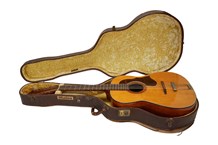They have just had to hand over a 36-lot sale of works by Alberto Giacometti (1901-66) with an estimated total value of €4.3-€5.8m (£2.7-£3.7m) to the Hôtel Drouot, moving swiftly to reach agreement with the latter on September 25 within hours of a court ruling banning them from conducting the sale themselves.
The Paris Tribunal de Grande Instance ruled that the sale, due to have been staged on September 28 at Christie’s Paris premises in Avenue Matignon, had judicial status and as such could still only be staged by a State-appointed commissaire-priseur judiciaire with the right to direct court-order sales, unlike the standard commercial sales which are now open to competition.
Giacometti’s wife Annette had called for the setting up of a Giacometti Foundation in her will, and the court ruling banning Christie’s was made because the sale had come about as a result of the Annette’s estate administrator, Hélène da Camara, applying to the courts in February 2002 to sell some of the artist’s works to a maximum value of €6m to finance the administrative costs involved in setting up the Foundation.
The earlier court approval of the sale gave it judicial status, the Tribunal ruled.
The sale was reorganised for the scheduled date under the banner of Etude de Ricqlès, to be conducted by François de Ricqlès – coincidentally a Christie’s employee (with the title of Vice-President France) and a State-appointed commissaire-priseur judiciaire with the right to direct court-order sales. But importantly, under the ruling, he was to act independently of Christie’s.
The court ruling followed a complaint lodged by Dominique Ribeyre in his capacity as President of the Chambre Nationale des Commissaires-Priseurs (the nationwide body representing the commissaires-priseurs judiciaires).
Ribeyre said he was “defending a basic principle, embodied in the new law, defining the distinction between ‘volontary’ sales and court-order sales”. He told the Antiques Trade Gazette that he had warned Christie’s and Camara back in July that the Chambre Nationale would oppose Christie’s right to stage the sale, but that he had waited until the publication of the sale catalogue before going to court on September 5. Ribeyre termed Christie’s attitude “imprudent”, adding: “They were sure of themselves.”
Commitment
Christie’s would not comment on the ruling, but Thomas Seydoux, head of Christie’s Modern Art Department in Paris, told the Gazette they were putting the setback down to the “experience of setting up in a country with a long history of a State auction monopoly”. He claimed that Christie’s decision not to appeal against the ruling, and facilitate the sale’s progress at Drouot, reflected a desire to protect the interests of consignor and potential buyers, and “show Christie’s commitment to the art market in this country… We’re preoccupied in trying to bounce back!”
Seydoux said that everyone who had shown interest in the sale had been informed immediately of the sale’s change in status and venue, and that no potential buyers had been deterred. The start of the sale was put back to 7.30pm, half an hour later than originally planned, to enable Christie’s to bus people who wished to attend the sale, yet were unaware of the venue change, across town to the Hôtel Drouot.
There was good reason for buyers to be undeterred: court-order sales have a State-fixed buyer’s premium of 10.764 per cent, whereas auctioneers are free to fix premiums at “volontary” sales. The buyer’s premium at Christie’s Paris would have been 20.93 per cent on the first €110,000 (£69,000), plus 11.96 per cent thereafter.
• As the Gazette went to press, the Association Giacometti launched a court challenge to the estate administrator’s justification for holding the sale in a bid to have the auction stopped altogether.
Sale setback shows French monopolies survive in part
FRENCH auction laws may have been reformed, but monopolies still exist, as Christie’s have just found to their cost.




